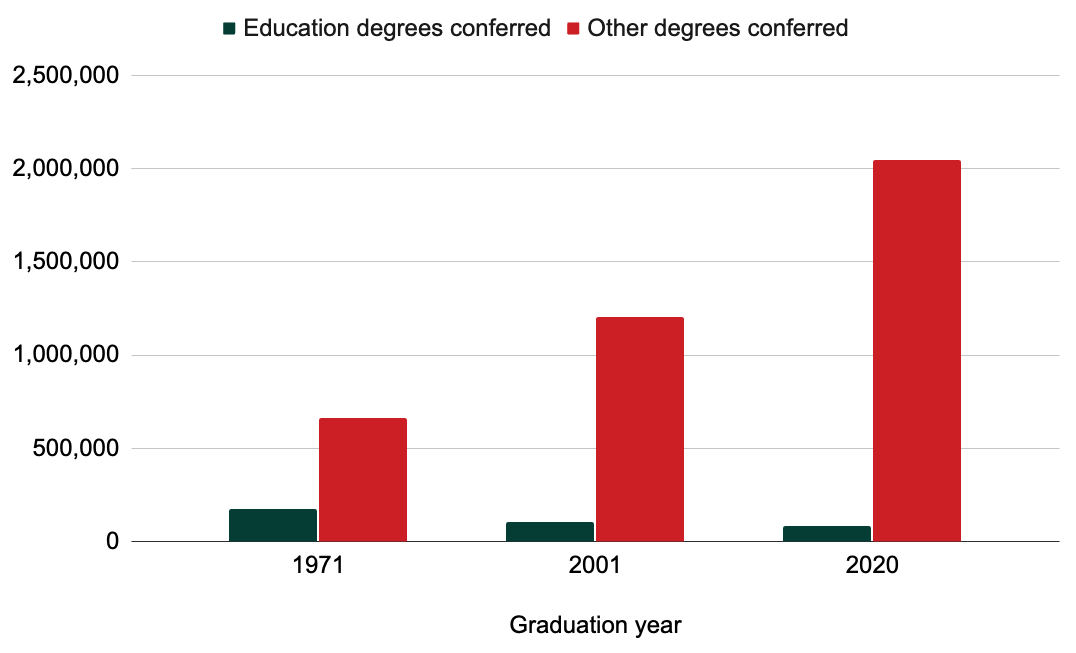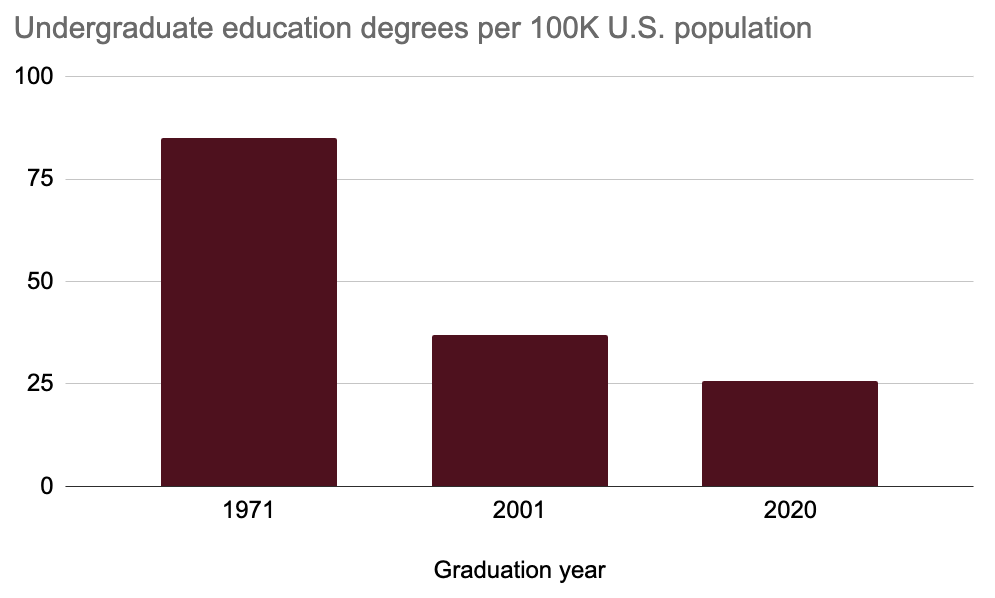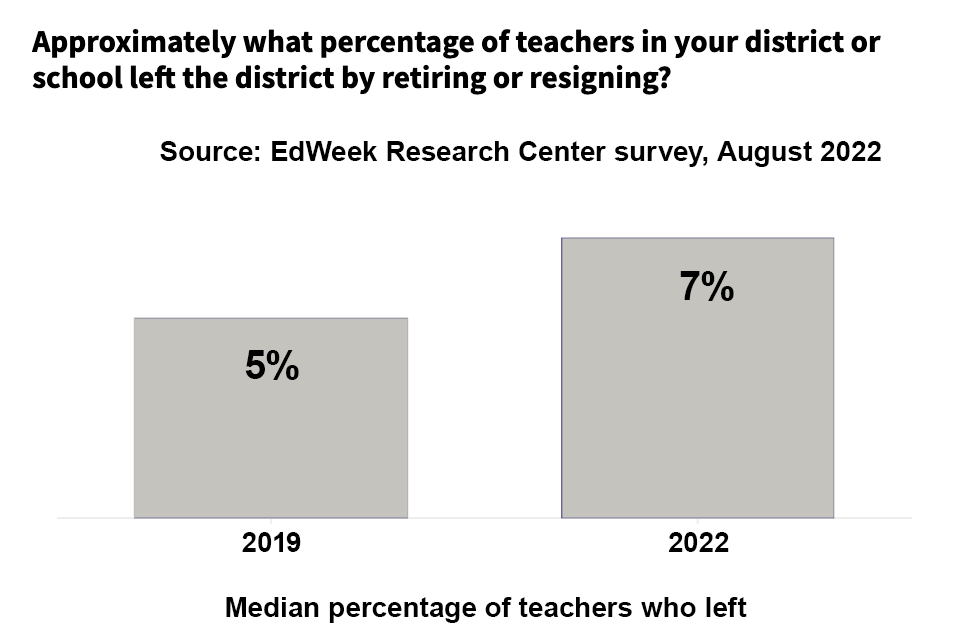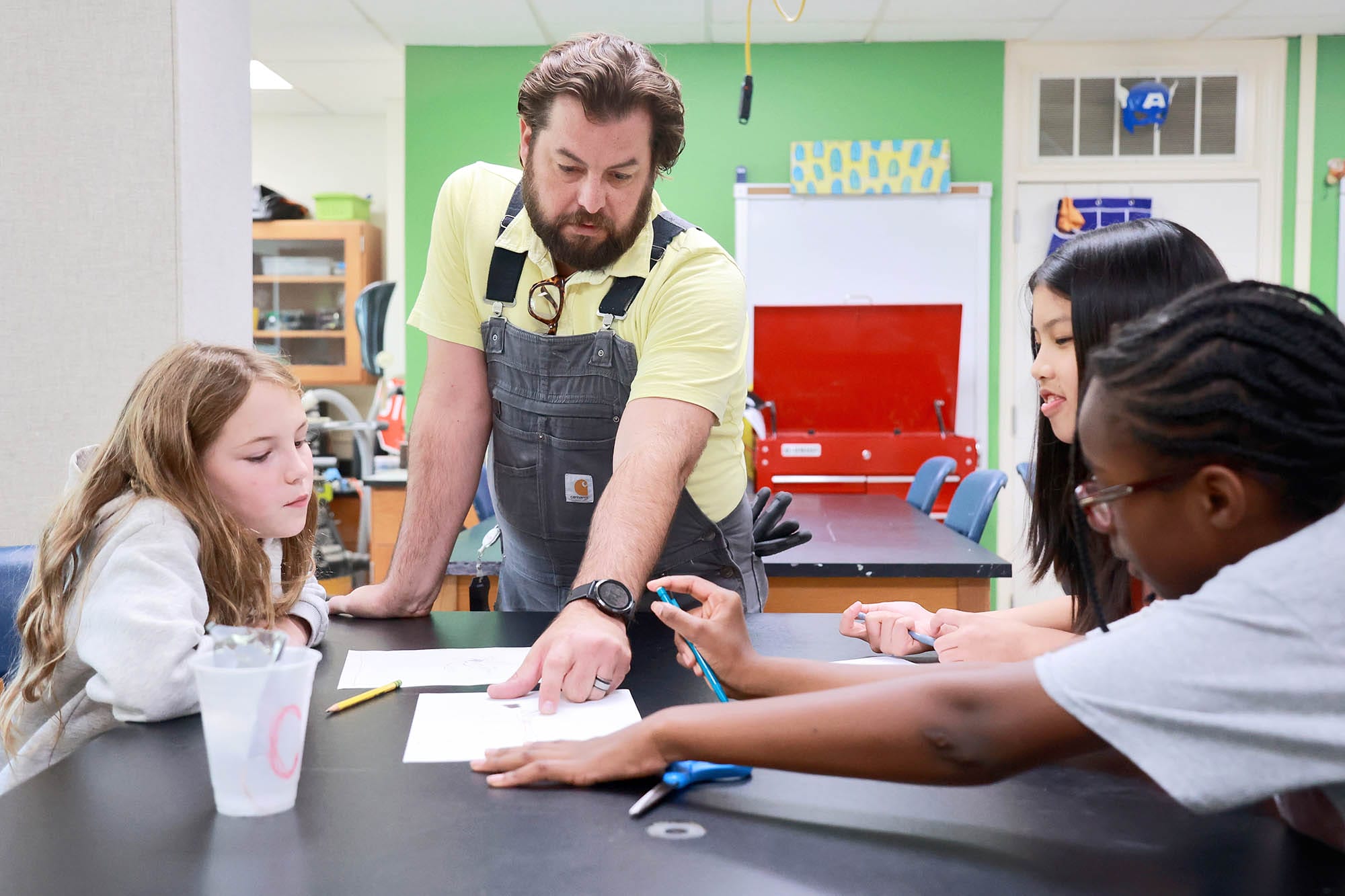“Earlier this year, I shifted to a revision-based model for writing,” one of our wonderful Upper School teachers shared with me last week. “It has fundamentally changed the conversations I have with students about their work—for the better! Instead of focusing on why they got points off, now they focus on what they did well, the things in their writing that sing and glow, and how to strengthen key pieces of their work.” This was her response to a question I asked all of our teachers recently: “What is a favorite lesson, topic, unit, lab, project, exercise, or other learning activity or experience for your students that you have loved teaching this year so far?”
Of the the challenges facing our nation today, the accelerating K-12 teacher crisis surely ranks among the most broadly, and protractedly, deleterious. In both absolute and relative terms, far fewer undergraduates are pursuing degrees in elementary and secondary education today than in the past. In 1971, American colleges and universities conferred approximately 176,000 degrees in education, which accounted for 21% of all undergraduate diplomas earned. By 2020, those figures had dropped to 85,000 and 4%, respectively.

Viewed through a different lens—one that comprehends the importance of maintaining a sufficiently sized K-12 teaching workforce for the sustainability of a high-functioning society—these data reveal a decrease from 85 undergraduate education degrees conferred per 100,000 United States residents in 1971 to only 26 in 2020, a 69% drop in the population of new entrants into the teaching profession relative to the population of the citizenry they serve. Parental attitudes surely play a role in this decline. In 1969, only 15% of United States parents answered “no” when asked, “Would you like your child to become a teacher?”’ In 2018, 54% of parents answered “no.”

Problems imposed by the dwindling number of new teachers are compounded by the dwindling number of experienced ones. Pandemic-related exhaustion, decreasing public trust, and the aging-out of baby boomers from the K-12 workforce all contribute to growing attrition from the teaching profession.

Because no greater responsibility rests with me as Head of School than to ensure that MICDS attracts, hires, and retains an exceptional teaching faculty, I regard our nation’s waning K-12 labor force as a significant long-term challenge to the School. I also see an opportunity in the face of such a challenge to celebrate the extraordinary teachers whom it is our great fortune to count among our own, and it was in this spirit that I posed my question (“What is a favorite learning activity for your students this year so far?”) to all of them last week. I have selected 10 of their responses at random to share with you here:
Our students created and built an articulated arm and then produced a video comparing the “robotic” arm to theirs. (Ms. Bouchard)
Each week, sixth-grade advisors nominate students in class meeting who have embodied or lived out one of the LEAD principles in class or in sixth-grade life in general. [LEAD principles are “Learn with curiosity and joy,” “Embrace challenge,” “Advocate for self and community,” and “Demonstrate collaboration and teamwork.”] To see the smile on the student’s face when a teacher nominates them, and to see how proud they are to walk up and get their LEAD rock and put it in the jar in front of all their peers, is simply awesome and amazing. (Mr. Duvall)
I am totally surprised (being more of a reading and writing kind of girl!) that our daily Math Talks in first grade are some of the best parts of my day! We start every math time with a picture and a very open-ended question: “What math questions do you have?” This simple question leads us to more advanced math topics than we might typically get to—even/odd, rows and columns, counting by multiples, estimating, sorting, greater than and less than…the list goes on and on and is always worthwhile! (Mrs. Gillis)
I do negotiation role play activities on both the Treaty of Versailles and the Yalta Conference in the World History class intended to illustrate how challenging it is for leaders of countries and their diplomats to reach agreement about issues they care about. I always love seeing how invested students quickly get in these roles, and how much they struggle to reach compromise. These are learning experiences that, despite the disagreements and conflicts they highlight (and bring into the classroom), are almost always reflected on with positivity by students. I’m always particularly impressed by students who manage to reach agreement on issues through compromise. (Mr. Rolnick)
Seventh graders learning how to broad jump, watching videos of our Upper School students performing the same movement, playing with new ideas and picking up on cues they saw from the video or heard me say during instructions, and having the ability to immediately improve their scores with subtle changes. They learn that biomechanics and work improve outcomes and that they are only scratching the surface of their potential. (Mr. Goldberg)
Student facilitations! Seniors select a teacher-provided short story and teach the class a 30-40 minute lesson, guiding their peers through activities and discussion questions to better understand the story. (Ms. Prince)
Written conversation. Students write a letter to me each week about anything they’d like, and I write a letter back. We continue all year long! This ongoing “paper” conversation offers a unique window into their personalities and wonderings and interests; it provides additional opportunity to connect; and it serves as an artifact to document growth and progress with writing skills over the course of the school year. Wins at every turn! (Mystery Lower School Teacher #1 )
My favorite takeaway from this year is not actually from current students, but from alumni. I am showered with messages weekly about how well MICDS has prepared students for college and the professional world. These messages affirm that the work that we are doing is impactful, meaningful, and essential. Whether it’s about their computer science, robotics, or engineering experiences, or how to write an English paper, or how to be their best self, it is a highlight of my day and keeps me going. (Mr. Menghini)
Seventh-grade Global Perspectives is currently in the middle of our Beliefs and Ideology unit, and we are studying the five major world religions. The students enjoy learning about all of them, and those who practice the religions have excitedly shared their beliefs and traditions with their classmates. The questions and conversations have been respectful and enlightening. During conferences, several parents commented that their students come home talking about what they learned that day, and that this has led to many great dinner conversations. (Mystery Middle School Teacher #1 )
Singing a cappella in the Chapel and the Black & White Hallway with the Eighth-Grade Concert Choir as we prepare for our upcoming Fall Concert. (Mr. Roberts)
You are welcome to peruse the complete list of “favorite things” responses from our teachers (and even from some members of our staff) here. Those of you who, like me, watched too many cartoons on Saturday mornings in the ’70s and ’80s might also be interested to know how our MICDS faculty responded when asked, “What are your favorite Schoolhouse Rock songs?”—because surely it was this animated series and no other influence that inspired them to commit their lives to teaching! The top vote-getters were, in alphabetical order, Conjunction Junction, I’m Just a Bill, Interjections!, Lolly, Lolly, Lolly, Get Your Adverbs Here, The Preamble, and Three is a Magic Number.
Teaching is fundamentally a selfless calling. Against cultural, demographic, and economic headwinds prevailing against it, we will strive at MICDS to enable and ennoble the efforts of our faculty on behalf of the children and adolescents they serve, sustaining them in this calling—and in turn sustaining the teachers who follow them—by sustaining an institutional culture that not only appreciates but dignifies and honors their good and essential work. It, and they, are the heart of what we do.
Always reason, always compassion, always courage. Happy weekend to your families!
Jay Rainey
Head of School
This week’s addition to the “Refrains for Rams” playlist is Conjunction Junction, written by Bob Dorough and performed by Jack Sheldon, Terry Morel, and Mary Sue Berry in 1973 for the Grammar Rock season of the Schoolhouse Rock! animated music video series (Spotify). Regrettably, the original recording is not available on Apple Music, but a live version by Dorough and his frequent collaborator Dave Frishberg (who wrote I’m Just a Bill for the 1976 America Rock season of the series) is a happy alternative.
